H2Uppp Southeast Asia's Green Hydrogen and Power-to-X Conference showcases regional clean energy potential
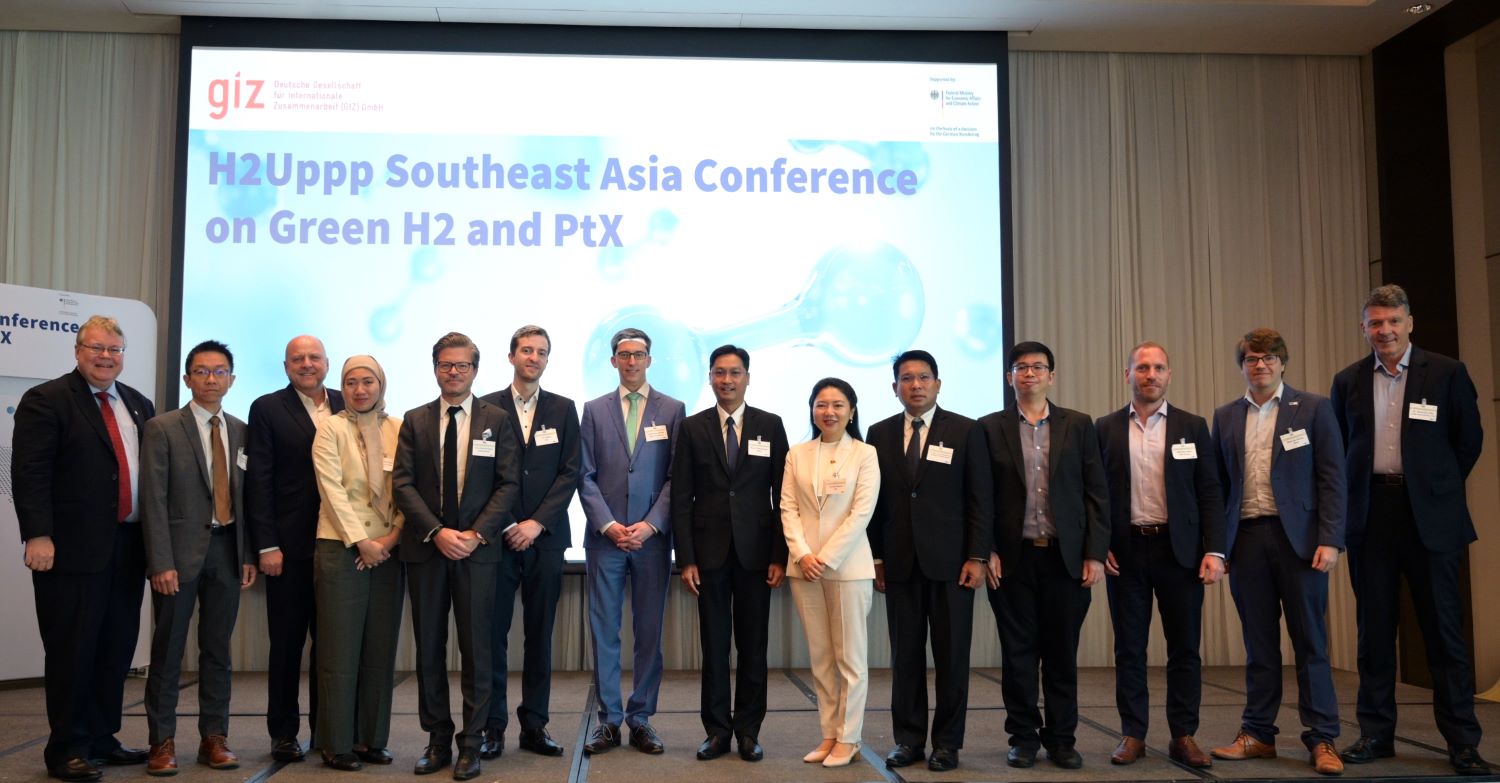
- GIZ and the German-Thai Chamber of Commerce organised a conference on the topic of Green Hydrogen and Power-to-X (PtX) in Southeast Asia.
- Discussions highlighted Europe’s leadership in green hydrogen, Thailand’s green hydrogen pathway, and regional projects showcasing diverse strategies for hydrogen adoption.
- The conference underscored the potential for regional collaboration to accelerate the adoption of green hydrogen and Power-to-X technologies in Southeast Asia.
9 October 2023, Bangkok –The Deutsche Gesellschaft für Internationale Zusammenarbeit (GIZ) GmbH, in collaboration with the German-Thai Chamber of Commerce (GTCC), organised a conference on the topic of Green Hydrogen and Power-to-X (PtX) in Southeast Asia. This hybrid event was part of the International Hydrogen Ramp-Up “H2Uppp” Programme and served as a platform to share insights into the potential of these sustainable energy solutions in the region. It brought together a diverse audience of experts, policymakers and stakeholders from both public and private sectors, with a total attendance of 236 individuals.
The conference began with insightful opening remarks from key figures, namely Mr Johannes Kerner, Economic and Commercial Counsellor of the German Embassy in Thailand; Dr Roland Wein, Executive Director of GTCC; and Ms Jarukan Rassiri, Cluster Coordinator of the Natural Resources, Energy and Mobility Cluster, GIZ Thailand. The speakers emphasised the importance of collaboration and private sector engagement in advancing the green hydrogen ecosystem. The H2Uppp programme, in line with the German government’s vision, underscores the importance of forging partnerships between the public and private sectors as a key driver of green hydrogen adoption.
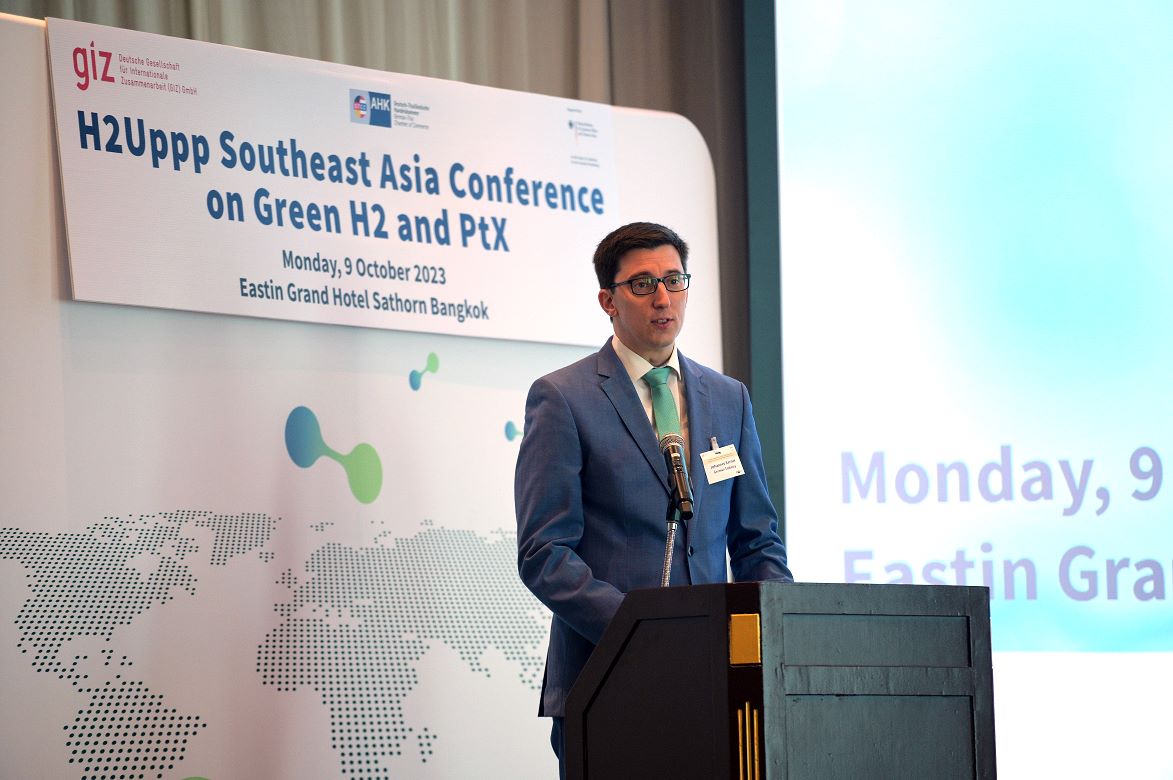
Europe’s Leading Role in Green Hydrogen
Mr Uwe Weichenhain, Senior Partner at the global consultancy firm Roland Berger, provided insights into the dynamic landscape of green hydrogen developments in Europe. He highlighted the unprecedented growth in project announcements driven by policy and regulation, due to the increasing policy targets across Europe which are backed by incentive schemes. Mr Weichenhain said that among the lessons learnt from the European green hydrogen market development is the need to focus on immediate market demand within sectors that are financially inclined and willing to invest in hydrogen in the short term, and to shift towards international trade in the medium term.
The Hydrogen Outlook for Thailand
Mr Sarat Prakobchat, Deputy Director-General of the Energy Policy and Planning Office (EPPO) in Thailand, emphasised the role of green hydrogen in contributing to Thailand’s goal of achieving carbon neutrality by 2050. Thailand anticipates the emergence of commercial opportunities for hydrogen in the power and industrial sectors in the medium term, starting from 2030, and expects hydrogen to be economically feasible across the power, industrial and transport sectors in the long term, from 2040 onwards. Currently, Thailand is in the pilot phase, with several green hydrogen projects in the pipeline, including the wind hydrogen hybrid system at the Lamtakong dam in Nakhon Ratchasima province. In addition, he underlined the importance of private sector support and policy roadmaps, which are vital to market growth.
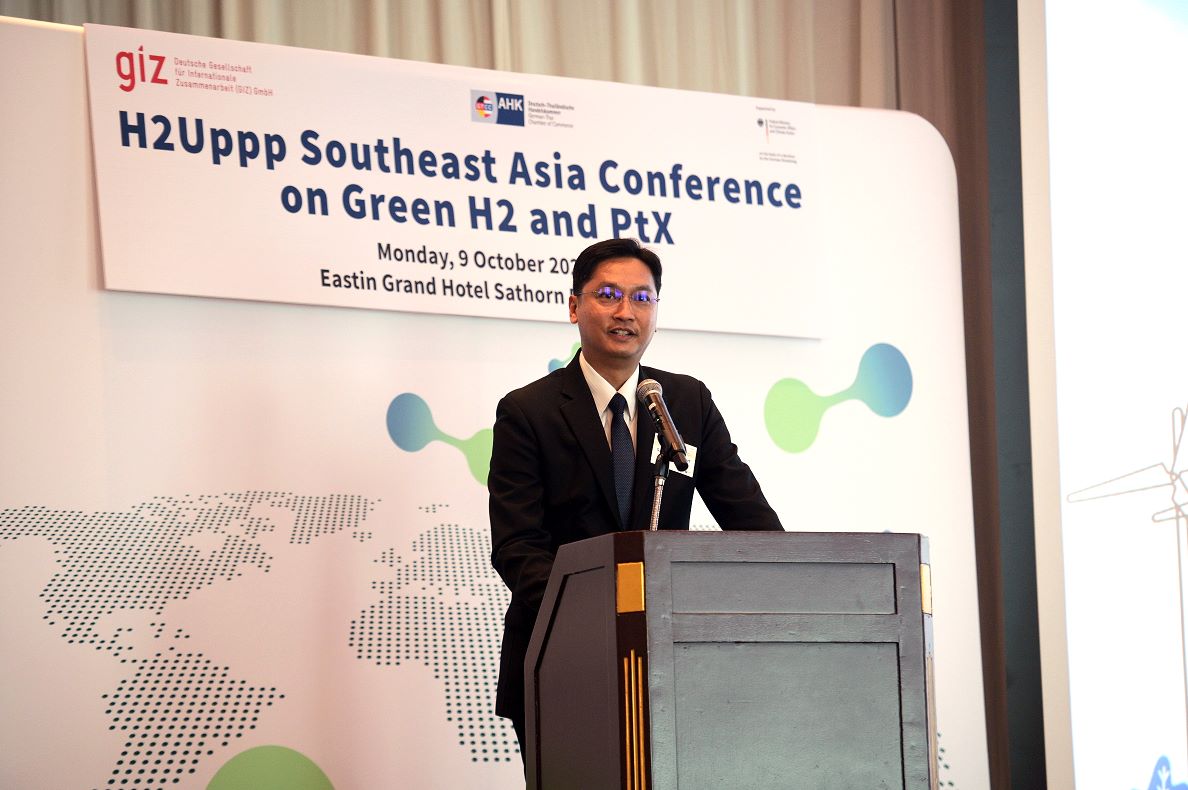
Mr Thumrong Ampornratana from the Board of Investment (BOI) of Thailand discussed the measures taken by BOI to attract investors in the hydrogen technology sector, such as income tax exemptions, import duties exemptions, and a long-term resident visa scheme.
GIZ’s Studies on Green Hydrogen and PtX
In the following session, experts from the consulting firm DNV, Dr Peerapat Vithayasricharoen and Mr Mats de Ronde, presented the results from the “Study series summary on market development for Green Hydrogen and Power-to-X(PtX) in Thailand”. This study, commissioned by H2Uppp, highlighted green hydrogen’s potential in the power, industry, and transport sectors, and provided recommendations for the policy roadmap to support the market’s growth.
Green Hydrogen Projects and Strategies in Southeast Asia
In the regional context, Ms Nadhilah Shani from the ASEAN Centre for Energy discussed the enablers of hydrogen technology in ASEAN, current green hydrogen development in the region, and the necessary steps for hydrogen adoption in ASEAN, including identifying priority sectors, developing clear strategies, and initiating pilot projects.
Representing Thailand, Dr Narin Phoawanich from the Electricity Generating Authority of Thailand (EGAT) presented national policies and frameworks supporting green hydrogen at various levels, shared information on pilot projects that are being implemented, and discussed the future direction for Thailand, involving additional studies and pilot projects.
Mr Brian Cameron from the international industrial and technology company Thyssenkrupp presented information on the TGS Tra Vinh Green Hydrogen Project in Vietnam. While the Vietnamese government has not set a specific policy related to green hydrogen, they consider it as a potential alternative energy to support their net-zero goal. Mr Cameron also emphasised keys for green hydrogen growth, which include the need for policy certainty, technology expertise, structured project development, and acknowledging project risks.
From Indonesia, Mr Mathieu Geze, representing the French green hydrogen company HDF Energy, discussed the HyPower (hydrogen-to-power) projects, which aim to reduce dependency on fossil fuels and support grid stability. Indonesia currently boasts 20 hydrogen projects with over 2 billion USD in investments.
Lastly, Dr Steve Graville from Linde Engineering introduced Linde’s green hydrogen production investment in Singapore, highlighting a project in Jurong Island, in which Linde has jointly developed an advanced green hydrogen production system. Singapore’s national hydrogen strategy aims to have hydrogen supply meeting half of the country’s power requirements by the year 2050.
Panel Discussion on Green Hydrogen Outlook in Southeast Asia
The conference concluded with a panel discussion on the regional outlook on green hydrogen and PtX. Panelists—Mr Brian Cameron, Dr Steve Graville, Mr Uwe Weichenhain, and Ms Nadhilah Shani, along with Dr Narun Suwanchotchoung, Director of the Hydrogen Thailand Club—emphasised the importance of national strategies on green hydrogen to provide clear signals to market participants. Regulatory frameworks and sector-specific targets were also highlighted as drivers for sectors to make the transition toward this technology. Moreover, conducting studies and business cases to mitigate the risks, exchanging knowledge and expertise on regional and global levels, and raising public awareness of green hydrogen and PtX as an attractive fuel for the future were discussed as essential components of the transition.
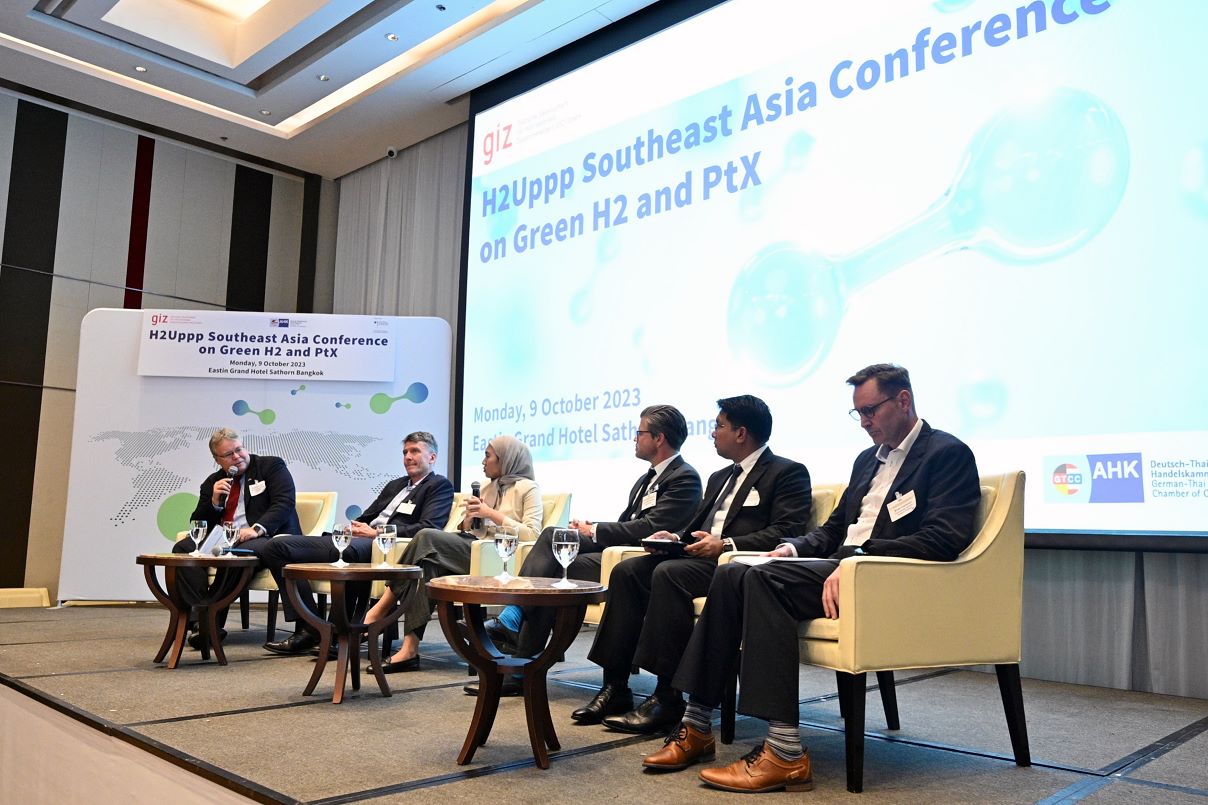
The conference served as a knowledge-sharing platform, promoting collaboration to accelerate the adoption of green hydrogen and Power-to-X technologies in Southeast Asia. By fostering partnerships and establishing common frameworks, Southeast Asia can pave the way for a vibrant hydrogen ecosystem. With shared goals and collective efforts, the region has the potential to not only reduce carbon emissions but also foster economic growth and innovation, contributing to a more sustainable future.
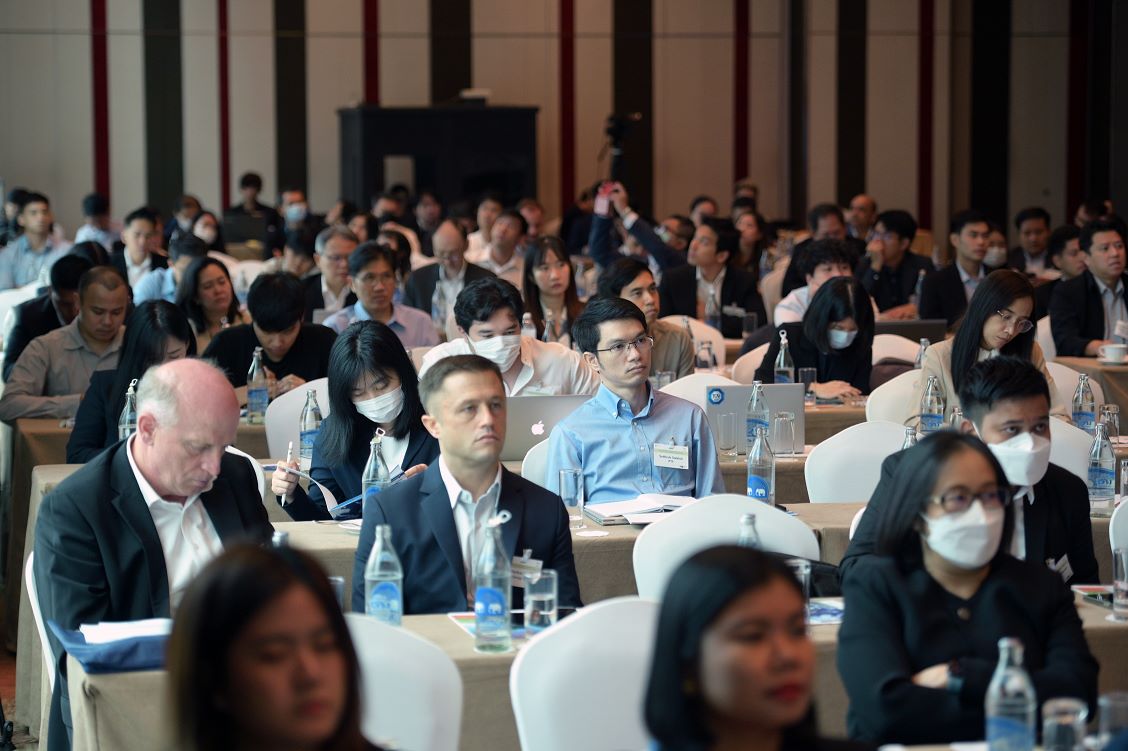
Financed by the German Federal Ministry for Economic Affairs and Climate Action (BMWK), the H2Uppp programme is being executed globally by the Deutsche Gesellschaft für Internationale Zusammenarbeit (GIZ) GmbH. Implemented in partnership with the German-Thai Chamber of Commerce (GTCC), Thailand is H2Uppp’s regional hub for Southeast Asia. H2Uppp aims to support the policy and market development for green hydrogen and Power-to-X through studies and training, the identification and initiation of public-private partnerships (PPP) and projects, and the promotion and dissemination of knowledge through the identification and connection of local and international hydrogen specialists, in particular, vis-à-vis the German private sector.
Tim Nees
H2Uppp Project Manager
Email:tim.nees(at)giz.de